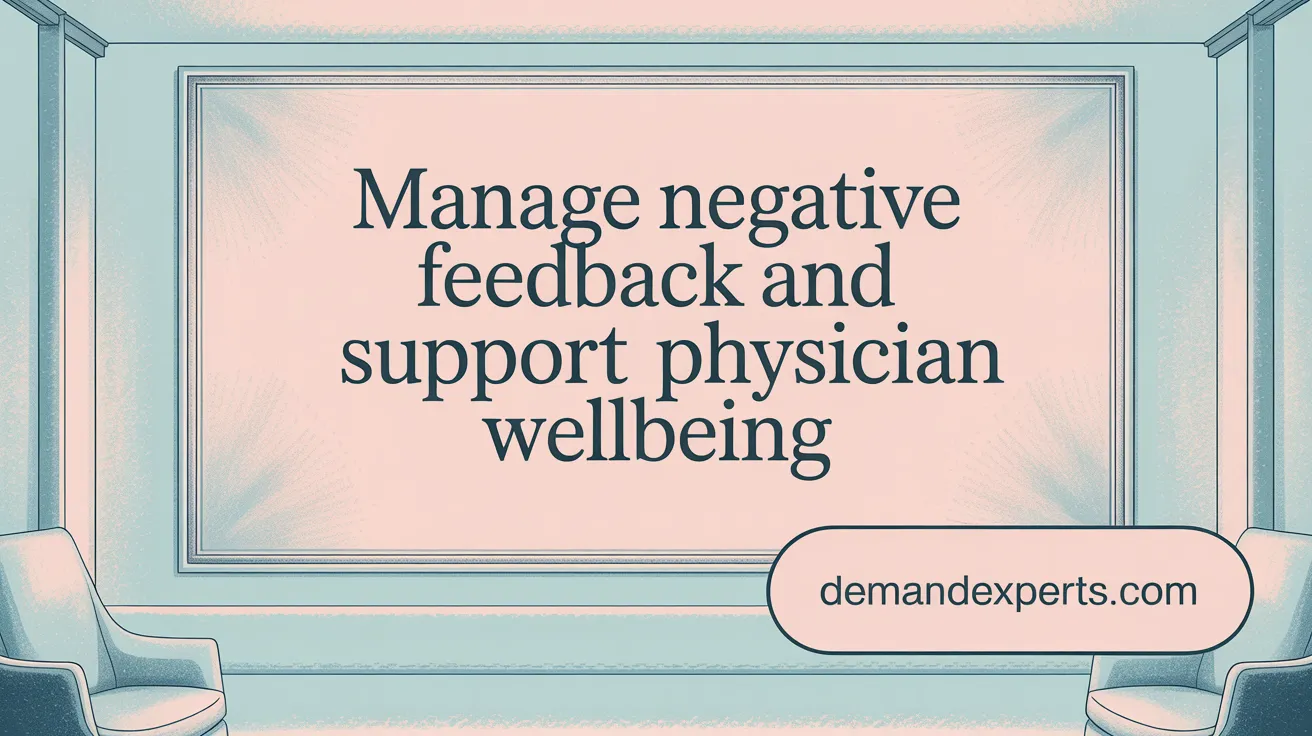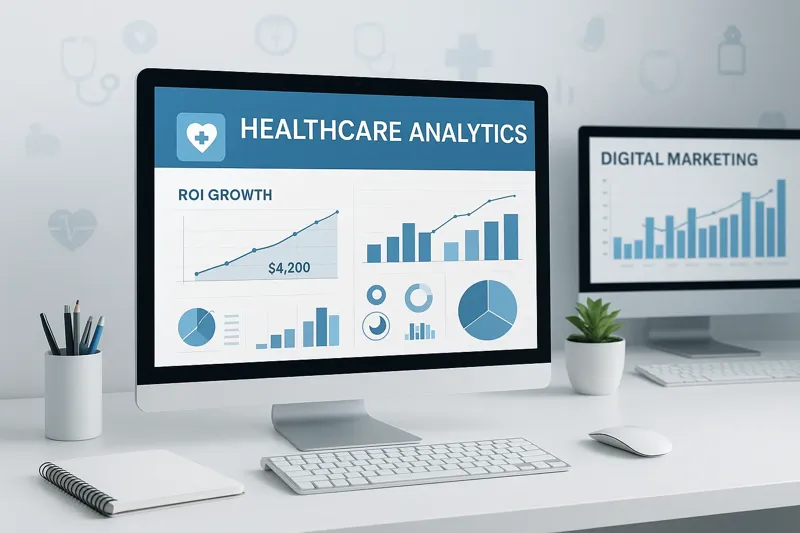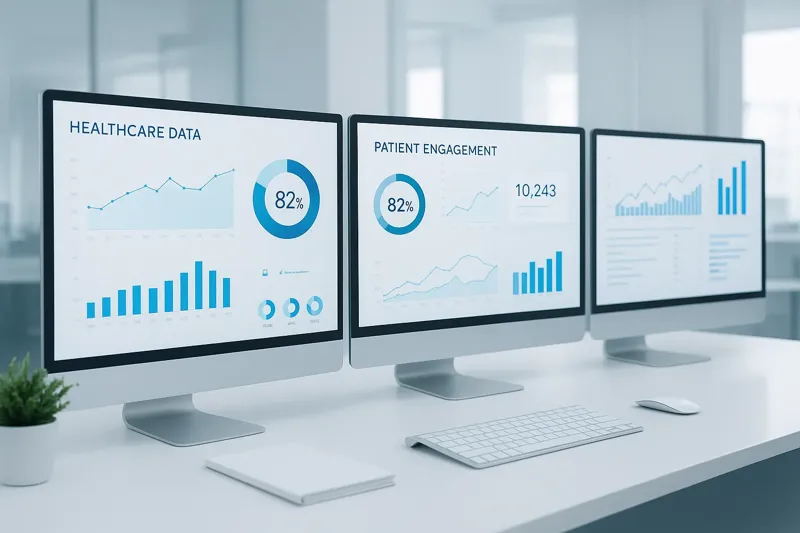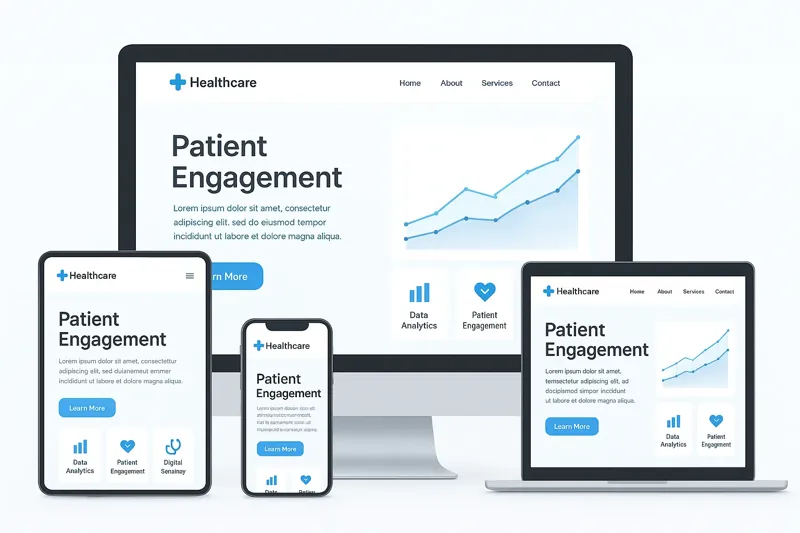The Critical Role of Online Reputation for Medical Practices
In today’s digital age, the reputation of medical practices hinges significantly on their online presence. With a staggering 84% of patients relying on online reviews to assess healthcare providers, managing digital reputation has become an indispensable strategy for attracting and retaining patients. This article explores the comprehensive strategies medical practices must employ to monitor, influence, and protect their professional image online, ensuring trust, credibility, and sustainable growth in a competitive healthcare market.
Why Online Reputation Matters for Medical Practices

How influential are online reviews in the healthcare sector?
Approximately 84% of patients rely on online reviews when choosing a medical practitioner. This makes online reviews a pivotal factor in shaping patient decisions. Patients often use review platforms such as Google, Healthgrades, and Yelp as a first step in researching healthcare providers.
Importance of online reviews in patient decision-making
Patients trust online reviews as much as personal recommendations. With nearly 84% depending on these reviews, a single poor rating can deter prospective patients. In fact, about 84% of patients are reluctant to visit physicians rated below four stars. Consequently, maintaining positive reviews can lead to increased patient acquisition and sustain practice growth, as discussed in Reputation Management for Doctors.
Impact of reputation on trust, credibility, and patient acquisition
A strong online reputation enhances first impressions, fosters patient trust, and builds credibility. Positive reviews and high ratings increase visibility in search engine results through improved SEO, boosting the likelihood of attracting new patients. In contrast, negative feedback requires prompt, professional responses to mitigate damage and maintain public confidence, following best practices outlined in Physician Online Reputation Management Dos and Don'ts.
Statistics on patient reliance on online reviews
- 84% of patients consult online reviews to assess healthcare providers.
- 77% start their search for a new doctor by reading reviews.
- 84% avoid physicians with ratings lower than four stars.
- Positive reviews can increase new patient referrals by over 30%.
The pervasive use of online reviews highlights the essential role of active reputation management for medical practices aiming to grow their patient base and maintain professional success.
Developing a Strong Digital Presence through Profile Optimization and SEO

How can medical practices optimize their digital presence?
Medical practices can significantly enhance their online visibility by focusing on profile optimization and search engine optimization (SEO). To start, maintaining accurate, complete, and consistent profiles across multiple review platforms such as Google My Business, HealthGrades, Yelp, and RateMDs is critical. Consistency in the practice name, address, phone number, and website details across listings builds trust and supports local SEO.
Incorporating targeted keywords related to healthcare services into business descriptions boosts search ranking and helps attract patients searching for those specific treatments. For example, including location-based keywords ensures higher visibility in "near me" searches, which are common among prospective patients (Optimizing Healthcare SEO).
Healthcare websites should be professional, fast-loading, and mobile-friendly. They must feature updated content, including provider biographies, detailed services offered, practice hours, and HIPAA-compliant patient portals to facilitate easy interaction and appointment scheduling (Online Reputation Monitoring: A Healthcare Practitioner's Guide).
Local SEO strategies such as optimizing meta tags, utilizing structured data, and encouraging positive patient reviews contribute to higher rankings on search engines. Regular updates and content marketing, such as educational blog posts, improve authority and patient engagement (Healthcare Reputation Management Strategies).
By combining comprehensive profile optimization with robust SEO best practices, medical practices can attract new patients, build credibility, and maintain a competitive edge in the digital healthcare marketplace (Reputation Management For Doctors).
Encouraging and Managing Patient Feedback Across Multiple Channels

What are effective methods to encourage and manage patient reviews?
Medical practices can boost patient review collection by leveraging multiple communication channels. Common techniques include sending automated emails and SMS messages post-appointment, offering digital check-ins that prompt feedback, and providing QR codes in the office or on receipts to simplify the review process (Importance of Online Reviews for Doctors, Benefits of Collecting Positive Patient Reviews).
Using reputation management software like DocResponse, AdvancedMD, and Birdeye streamlines this effort. These platforms automate review requests, monitor online feedback from various sources, and provide tools for responding to patient comments efficiently (DocResponse Reputation Management Software, Top Reputation Management Tools for Doctors. Automation saves time and ensures a consistent approach to gathering authentic patient insights (Reputation Management For Doctors.
Using Automated Reputation Management Software
Automated tools not only facilitate review solicitations but also enable real-time tracking and management of patient feedback. These systems integrate with practice workflows, allowing providers to monitor responses across Google, Yelp, Healthgrades, and social media from unified dashboards (Online Reputation Management for Doctors, Managing online reputation in health care). Such software often includes customizable survey options and analytics that help identify satisfaction trends and areas for improvement (Features of DocResponse Software, Real-time Feedback Collection in Healthcare).
Handling Feedback Professionally and Ethically
Respect for patient confidentiality is paramount. Healthcare providers must comply with HIPAA regulations when managing and responding to online reviews (Managing Physicians' Online Reputation, HIPAA Guidelines for Review Responses). While public responses should avoid disclosing protected health information, acknowledging feedback promptly and empathetically can build trust (Responding to Online Reviews Professionally. For negative reviews, practices should seek to resolve issues offline and follow up directly with the patient (Handling Negative Reviews Effectively, Responding to Negative Reviews Effectively.
By actively soliciting and managing patient feedback across multiple channels and adhering to ethical practices, medical providers strengthen their online reputation, enhance patient trust, and ultimately support long-term practice growth (Reputation Management For Doctors, Building patient trust through reputation).
Responding to Online Reviews: Strategies for Positive and Negative Feedback

How should medical practices respond to online reviews?
Medical practices should prioritize timely and professional responses to all online reviews, whether positive or negative. Prompt acknowledgment of positive feedback with gratitude reinforces patient trust and encourages continued loyalty. Negative reviews require an empathetic and constructive approach, recognizing the patient's concerns and addressing them with care (Importance of Online Reviews for Healthcare Providers.
Due to HIPAA regulations, direct public responses cannot disclose protected health information or specific details about a patient's care. Instead, practices can invite patients to discuss concerns privately through phone calls, secure messaging, or patient satisfaction surveys (HIPAA Guidelines for Review Responses, Responding to Negative Reviews Effectively. These private channels help resolve issues while maintaining confidentiality.
Importance of timely and professional responses
Timely responses show patients that their opinions matter and that the practice is committed to quality care. Professional communication—clear, respectful, and empathetic—can mitigate damage from adverse feedback and demonstrate accountability (Responding to Online Reviews Professionally. Effective response strategies help build a positive online reputation and enhance patient confidence (Increasing Patient Trust through Reputation.
Guidelines within HIPAA constraints
Responses must avoid revealing any personal health information or specifics about a patient's treatment. Phrases used should be general and express willingness to resolve concerns without confirming the patient's identity. Utilizing private follow-up methods preserves privacy and complies with legal standards (Managing Physicians' Online Reputation with HIPAA Compliance, Using Patient Satisfaction Surveys for Doctors.
Turning negative reviews into opportunities
Negative reviews present opportunities to improve services and showcase responsiveness. By acknowledging concerns, offering offline resolution, and following up, practices can often turn dissatisfied patients into advocates (Handling Negative Reviews Effectively, Physician Response to Negative Online Feedback). Such efforts demonstrate transparency and a dedication to continuous quality improvement, which resonate positively with both current and prospective patients (Improving Patient Experience with Feedback, Importance of Patient Feedback).
Leveraging Social Proof: Testimonials, Case Studies, and Community Engagement
How can social proof enhance a medical practice’s reputation?
Social proof significantly boosts a medical practice’s reputation by building credibility and patient trust. Displaying patient testimonials and success stories prominently on websites, brochures, and social media channels allows prospective patients to connect with real experiences. These authentic narratives create reassurance, illustrating the quality of care and positive outcomes.
Using patient testimonials and success stories
Patient testimonials serve as powerful endorsements that showcase the provider’s expertise and compassionate care. Case studies detailing specific treatments or patient journeys further demonstrate effectiveness and reliability. This content not only enhances confidence among new patients but also supports SEO efforts, improving online visibility (Improving Doctor SEO.
Building trust through social media and educational content
Active engagement on social media platforms helps medical practices share educational information and answer common health questions. Providing value and transparency through blog posts, videos, and Q&A sessions fosters an approachable and trusted image (Building physician reputation on social media). This outreach encourages patient interaction and strengthens the practice’s online community.
Community-building tactics
Community involvement through verified profiles on platforms like NextDoor amplifies word-of-mouth referrals (Using Facebook and NextDoor for doctors. Recognitions such as Neighborhood Favorite awards and local endorsements reinforce the practice’s authentic reputation. Hosting or participating in community events and health education sessions further solidifies trust and lasting patient relationships.
In summary, leveraging social proof by combining patient testimonials, relatable educational content, and active community engagement creates a robust foundation for reputation enhancement and competitive advantage (Reputation Management For Doctors.
Enhancing Patient Experience to Drive Positive Reviews
How does patient experience impact online reputation?
A positive patient experience is a major driver of favorable online reviews. Patients who encounter streamlined administrative processes and clear, empathetic communication are more likely to leave positive feedback. These experiences build trust and credibility , which enhance the overall reputation of healthcare providers.
Improving administrative processes and communication
Efficient appointment scheduling, reduced wait times, and transparent communication play crucial roles in patient satisfaction. Simplifying these processes minimizes patient frustration and can lead to better online reviews. Clear explanations of findings, costs, and follow-up care also contribute to a more positive patient experience (patient experience feedback).
Staff training for patient satisfaction
Training healthcare staff in active listening, empathy, and conflict resolution can transform patient interactions. Skilled communication fosters a welcoming environment and resolves issues before they escalate, increasing the likelihood of positive patient feedback (Training Staff for Reputation Management.
Using patient satisfaction surveys for continuous improvement
Deploying patient satisfaction surveys—such as DocResponse’s Forms on Demand—allows practices to gather actionable feedback. These tools help identify specific areas for improvement. When feedback is systematically analyzed and acted upon, it enhances patient loyalty and encourages more positive online reviews (Importance of Patient Feedback.
By focusing on effective communication, streamlined processes, and staff development, healthcare providers can significantly improve patient experience and thereby strengthen their online reputation.
Monitoring and Analyzing Online Reputation for Ongoing Improvement
Why is continuous monitoring of online reputation important?
Continuous monitoring of a healthcare provider’s online reputation is essential for staying ahead in a competitive market. This process helps detect feedback trends, identify opportunities, and spot emerging issues quickly. With 84% of patients relying on online reviews to assess providers, constant vigilance ensures that any concerns are addressed promptly, preserving trust and credibility.
Regular monitoring of review platforms and social media
Healthcare practices must regularly track patient reviews across multiple platforms such as Google, Healthgrades, Yelp, and social media sites. This regular review helps maintain an accurate and up-to-date understanding of patient sentiment. Tools that consolidate feedback from numerous sites streamline this process and enable faster responses to both positive and negative reviews, reinforcing patient engagement and loyalty through review management tools for doctors.
Social listening and sentiment analysis
Beyond simple star ratings, social listening tools and sentiment analysis delve into the nuance of patient feedback. These technologies capture qualitative data, including emotions and recurring themes within reviews. This detailed insight allows providers to comprehend patient experience on a deeper level and address underlying issues that might not be immediately obvious.
Using analytics to guide reputation strategy
Analytics from reputation management software provide actionable guidance by highlighting critical areas for improvement and operational changes. Tracking trends over time helps healthcare organizations benchmark performance and measure the impact of interventions. Data-driven reputation strategies enhance patient satisfaction and can improve online ratings and search engine rankings, thus attracting more patients.
Integrating regular monitoring, social listening, and analytics equips healthcare providers to maintain a strong, trustworthy online presence. This ongoing approach safeguards reputation while facilitating continuous improvement in patient care and engagement.
Handling the Challenges of Negative Reviews and Protecting Physician Morale

What challenges do negative reviews present to physicians and how can they be managed?
Negative online reviews pose significant challenges for physicians, impacting both morale and professional behavior. They can lead to reduced confidence and higher stress levels, with younger physicians particularly vulnerable to burnout due to heightened social pressure (Online reviews a growing threat to physician morale and patient care).
Impact of online reviews on physician morale and behavior
Research highlights that negative ratings act as unexpected shocks prompting physicians to enhance their online communication efforts. They tend to engage more deeply with patients online, adopting a more positive tone and improving the clarity of their messages. This shows a constructive response to criticism where physicians increase both the quantity and quality of interactions to rebuild trust (negative online ratings on physician effort.
Psychological effects and burnout risks
Despite adaptive communication, the presence of negative feedback contributes to anxiety and emotional strain, sometimes eroding empathy and compassion—qualities essential for healthcare quality. The continual pressure to maintain a perfect online image can affect clinical decision-making and reduce physician morale (online reviews a growing threat to physician morale and patient care.
Strategies for maintaining professionalism and resilience
Successful management involves training physicians and staff on constructive response techniques and emotional resilience. Emphasizing perspective-taking, avoiding impulsive reactions, and using negative feedback as an opportunity for care improvement are vital (Best Practices in Doctor Reputation Management, 10 Online Reputation Management Rules for Physicians).
Additionally, practices should reinforce a culture where patient feedback supports quality enhancement rather than personal criticism. Incorporating appreciation for positive reviews and employing reputation management tools can help balance negative comments (DocResponse Reputation Management Software, Top Reputation Management Tools for Doctors. Ultimately, protecting physician morale requires blending professional response standards with systemic support and self-care practices (Managing Your Online Reputation in Health Care, Why Reputation Management Is Crucial for Growing Your Medical Practice).
Integrating Reputation Management into Overall Healthcare Strategy
How can reputation management be integrated into broader healthcare practice goals?
Reputation management must seamlessly align with healthcare goals such as patient acquisition, retention, and quality improvement. By anchoring reputation efforts to these objectives, practices ensure that managing online presence directly supports attracting and keeping patients, while fostering care quality. For more details, see Reputation Management For Doctors.
Using AI and automation tools
Automation and AI technologies play an essential role in modern reputation management. These tools streamline the monitoring of online reviews and patient feedback, perform sentiment analysis to identify trends, and prompt healthcare providers to respond quickly and appropriately. Automation lightens the operational workload, enabling staff to focus on enhancing patient experience. Learn more about these strategies at Reputation management strategies in healthcare and doctor reputation management software.
Staff involvement and ethical considerations
Incorporating staff across the practice into reputation efforts strengthens outcomes. Training on ethics, privacy laws such as HIPAA, and effective communication ensures that responses maintain confidentiality and professionalism. When all team members engage in interpreting patient feedback and participating in quality improvement initiatives, this collective approach fosters consistent service standards and a positive brand image. Guidance on Training staff for reputation management and HIPAA Guidelines for Review Responses can facilitate this process.
Integrating reputation management into overall healthcare strategy not only builds trust and credibility but also delivers competitive advantage and supports sustainable growth. For a comprehensive overview, visit Why reputation management is crucial for growing your medical practice.
Sustaining a Trusted Medical Practice through Proactive Online Reputation Management
Managing online reputation and reviews is no longer optional but a fundamental component of medical practice success. With the vast majority of patients consulting online reviews before selecting healthcare providers, practices must adopt a multifaceted approach encompassing profile optimization, patient engagement, professional review responses, and continuous feedback analysis. Incorporating reputation management within the overall strategy ensures enhanced patient trust, higher visibility, improved patient experience, and a resilient, competitive position in evolving healthcare markets. Embracing technology, ethical practices, and staff involvement will empower medical providers to build lasting relationships and sustain growth in the digital age.
The Critical Role of Online Reputation for Medical Practices
In today’s digital age, the reputation of medical practices hinges significantly on their online presence. With a staggering 84% of patients relying on online reviews to assess healthcare providers, managing digital reputation has become an indispensable strategy for attracting and retaining patients. This article explores the comprehensive strategies medical practices must employ to monitor, influence, and protect their professional image online, ensuring trust, credibility, and sustainable growth in a competitive healthcare market.
Why Online Reputation Matters for Medical Practices

How influential are online reviews in the healthcare sector?
Approximately 84% of patients rely on online reviews when choosing a medical practitioner. This makes online reviews a pivotal factor in shaping patient decisions. Patients often use review platforms such as Google, Healthgrades, and Yelp as a first step in researching healthcare providers.
Importance of online reviews in patient decision-making
Patients trust online reviews as much as personal recommendations. With nearly 84% depending on these reviews, a single poor rating can deter prospective patients. In fact, about 84% of patients are reluctant to visit physicians rated below four stars. Consequently, maintaining positive reviews can lead to increased patient acquisition and sustain practice growth, as discussed in Reputation Management for Doctors.
Impact of reputation on trust, credibility, and patient acquisition
A strong online reputation enhances first impressions, fosters patient trust, and builds credibility. Positive reviews and high ratings increase visibility in search engine results through improved SEO, boosting the likelihood of attracting new patients. In contrast, negative feedback requires prompt, professional responses to mitigate damage and maintain public confidence, following best practices outlined in Physician Online Reputation Management Dos and Don'ts.
Statistics on patient reliance on online reviews
- 84% of patients consult online reviews to assess healthcare providers.
- 77% start their search for a new doctor by reading reviews.
- 84% avoid physicians with ratings lower than four stars.
- Positive reviews can increase new patient referrals by over 30%.
The pervasive use of online reviews highlights the essential role of active reputation management for medical practices aiming to grow their patient base and maintain professional success.
Developing a Strong Digital Presence through Profile Optimization and SEO

How can medical practices optimize their digital presence?
Medical practices can significantly enhance their online visibility by focusing on profile optimization and search engine optimization (SEO). To start, maintaining accurate, complete, and consistent profiles across multiple review platforms such as Google My Business, HealthGrades, Yelp, and RateMDs is critical. Consistency in the practice name, address, phone number, and website details across listings builds trust and supports local SEO.
Incorporating targeted keywords related to healthcare services into business descriptions boosts search ranking and helps attract patients searching for those specific treatments. For example, including location-based keywords ensures higher visibility in "near me" searches, which are common among prospective patients (Optimizing Healthcare SEO).
Healthcare websites should be professional, fast-loading, and mobile-friendly. They must feature updated content, including provider biographies, detailed services offered, practice hours, and HIPAA-compliant patient portals to facilitate easy interaction and appointment scheduling (Online Reputation Monitoring: A Healthcare Practitioner's Guide).
Local SEO strategies such as optimizing meta tags, utilizing structured data, and encouraging positive patient reviews contribute to higher rankings on search engines. Regular updates and content marketing, such as educational blog posts, improve authority and patient engagement (Healthcare Reputation Management Strategies).
By combining comprehensive profile optimization with robust SEO best practices, medical practices can attract new patients, build credibility, and maintain a competitive edge in the digital healthcare marketplace (Reputation Management For Doctors).
Encouraging and Managing Patient Feedback Across Multiple Channels

What are effective methods to encourage and manage patient reviews?
Medical practices can boost patient review collection by leveraging multiple communication channels. Common techniques include sending automated emails and SMS messages post-appointment, offering digital check-ins that prompt feedback, and providing QR codes in the office or on receipts to simplify the review process (Importance of Online Reviews for Doctors, Benefits of Collecting Positive Patient Reviews).
Using reputation management software like DocResponse, AdvancedMD, and Birdeye streamlines this effort. These platforms automate review requests, monitor online feedback from various sources, and provide tools for responding to patient comments efficiently (DocResponse Reputation Management Software, Top Reputation Management Tools for Doctors. Automation saves time and ensures a consistent approach to gathering authentic patient insights (Reputation Management For Doctors.
Using Automated Reputation Management Software
Automated tools not only facilitate review solicitations but also enable real-time tracking and management of patient feedback. These systems integrate with practice workflows, allowing providers to monitor responses across Google, Yelp, Healthgrades, and social media from unified dashboards (Online Reputation Management for Doctors, Managing online reputation in health care). Such software often includes customizable survey options and analytics that help identify satisfaction trends and areas for improvement (Features of DocResponse Software, Real-time Feedback Collection in Healthcare).
Handling Feedback Professionally and Ethically
Respect for patient confidentiality is paramount. Healthcare providers must comply with HIPAA regulations when managing and responding to online reviews (Managing Physicians' Online Reputation, HIPAA Guidelines for Review Responses). While public responses should avoid disclosing protected health information, acknowledging feedback promptly and empathetically can build trust (Responding to Online Reviews Professionally. For negative reviews, practices should seek to resolve issues offline and follow up directly with the patient (Handling Negative Reviews Effectively, Responding to Negative Reviews Effectively.
By actively soliciting and managing patient feedback across multiple channels and adhering to ethical practices, medical providers strengthen their online reputation, enhance patient trust, and ultimately support long-term practice growth (Reputation Management For Doctors, Building patient trust through reputation).
Responding to Online Reviews: Strategies for Positive and Negative Feedback

How should medical practices respond to online reviews?
Medical practices should prioritize timely and professional responses to all online reviews, whether positive or negative. Prompt acknowledgment of positive feedback with gratitude reinforces patient trust and encourages continued loyalty. Negative reviews require an empathetic and constructive approach, recognizing the patient's concerns and addressing them with care (Importance of Online Reviews for Healthcare Providers.
Due to HIPAA regulations, direct public responses cannot disclose protected health information or specific details about a patient's care. Instead, practices can invite patients to discuss concerns privately through phone calls, secure messaging, or patient satisfaction surveys (HIPAA Guidelines for Review Responses, Responding to Negative Reviews Effectively. These private channels help resolve issues while maintaining confidentiality.
Importance of timely and professional responses
Timely responses show patients that their opinions matter and that the practice is committed to quality care. Professional communication—clear, respectful, and empathetic—can mitigate damage from adverse feedback and demonstrate accountability (Responding to Online Reviews Professionally. Effective response strategies help build a positive online reputation and enhance patient confidence (Increasing Patient Trust through Reputation.
Guidelines within HIPAA constraints
Responses must avoid revealing any personal health information or specifics about a patient's treatment. Phrases used should be general and express willingness to resolve concerns without confirming the patient's identity. Utilizing private follow-up methods preserves privacy and complies with legal standards (Managing Physicians' Online Reputation with HIPAA Compliance, Using Patient Satisfaction Surveys for Doctors.
Turning negative reviews into opportunities
Negative reviews present opportunities to improve services and showcase responsiveness. By acknowledging concerns, offering offline resolution, and following up, practices can often turn dissatisfied patients into advocates (Handling Negative Reviews Effectively, Physician Response to Negative Online Feedback). Such efforts demonstrate transparency and a dedication to continuous quality improvement, which resonate positively with both current and prospective patients (Improving Patient Experience with Feedback, Importance of Patient Feedback).
Leveraging Social Proof: Testimonials, Case Studies, and Community Engagement
How can social proof enhance a medical practice’s reputation?
Social proof significantly boosts a medical practice’s reputation by building credibility and patient trust. Displaying patient testimonials and success stories prominently on websites, brochures, and social media channels allows prospective patients to connect with real experiences. These authentic narratives create reassurance, illustrating the quality of care and positive outcomes.
Using patient testimonials and success stories
Patient testimonials serve as powerful endorsements that showcase the provider’s expertise and compassionate care. Case studies detailing specific treatments or patient journeys further demonstrate effectiveness and reliability. This content not only enhances confidence among new patients but also supports SEO efforts, improving online visibility (Improving Doctor SEO.
Building trust through social media and educational content
Active engagement on social media platforms helps medical practices share educational information and answer common health questions. Providing value and transparency through blog posts, videos, and Q&A sessions fosters an approachable and trusted image (Building physician reputation on social media). This outreach encourages patient interaction and strengthens the practice’s online community.
Community-building tactics
Community involvement through verified profiles on platforms like NextDoor amplifies word-of-mouth referrals (Using Facebook and NextDoor for doctors. Recognitions such as Neighborhood Favorite awards and local endorsements reinforce the practice’s authentic reputation. Hosting or participating in community events and health education sessions further solidifies trust and lasting patient relationships.
In summary, leveraging social proof by combining patient testimonials, relatable educational content, and active community engagement creates a robust foundation for reputation enhancement and competitive advantage (Reputation Management For Doctors.
Enhancing Patient Experience to Drive Positive Reviews
How does patient experience impact online reputation?
A positive patient experience is a major driver of favorable online reviews. Patients who encounter streamlined administrative processes and clear, empathetic communication are more likely to leave positive feedback. These experiences build trust and credibility , which enhance the overall reputation of healthcare providers.
Improving administrative processes and communication
Efficient appointment scheduling, reduced wait times, and transparent communication play crucial roles in patient satisfaction. Simplifying these processes minimizes patient frustration and can lead to better online reviews. Clear explanations of findings, costs, and follow-up care also contribute to a more positive patient experience (patient experience feedback).
Staff training for patient satisfaction
Training healthcare staff in active listening, empathy, and conflict resolution can transform patient interactions. Skilled communication fosters a welcoming environment and resolves issues before they escalate, increasing the likelihood of positive patient feedback (Training Staff for Reputation Management.
Using patient satisfaction surveys for continuous improvement
Deploying patient satisfaction surveys—such as DocResponse’s Forms on Demand—allows practices to gather actionable feedback. These tools help identify specific areas for improvement. When feedback is systematically analyzed and acted upon, it enhances patient loyalty and encourages more positive online reviews (Importance of Patient Feedback.
By focusing on effective communication, streamlined processes, and staff development, healthcare providers can significantly improve patient experience and thereby strengthen their online reputation.
Monitoring and Analyzing Online Reputation for Ongoing Improvement
Why is continuous monitoring of online reputation important?
Continuous monitoring of a healthcare provider’s online reputation is essential for staying ahead in a competitive market. This process helps detect feedback trends, identify opportunities, and spot emerging issues quickly. With 84% of patients relying on online reviews to assess providers, constant vigilance ensures that any concerns are addressed promptly, preserving trust and credibility.
Regular monitoring of review platforms and social media
Healthcare practices must regularly track patient reviews across multiple platforms such as Google, Healthgrades, Yelp, and social media sites. This regular review helps maintain an accurate and up-to-date understanding of patient sentiment. Tools that consolidate feedback from numerous sites streamline this process and enable faster responses to both positive and negative reviews, reinforcing patient engagement and loyalty through review management tools for doctors.
Social listening and sentiment analysis
Beyond simple star ratings, social listening tools and sentiment analysis delve into the nuance of patient feedback. These technologies capture qualitative data, including emotions and recurring themes within reviews. This detailed insight allows providers to comprehend patient experience on a deeper level and address underlying issues that might not be immediately obvious.
Using analytics to guide reputation strategy
Analytics from reputation management software provide actionable guidance by highlighting critical areas for improvement and operational changes. Tracking trends over time helps healthcare organizations benchmark performance and measure the impact of interventions. Data-driven reputation strategies enhance patient satisfaction and can improve online ratings and search engine rankings, thus attracting more patients.
Integrating regular monitoring, social listening, and analytics equips healthcare providers to maintain a strong, trustworthy online presence. This ongoing approach safeguards reputation while facilitating continuous improvement in patient care and engagement.
Handling the Challenges of Negative Reviews and Protecting Physician Morale

What challenges do negative reviews present to physicians and how can they be managed?
Negative online reviews pose significant challenges for physicians, impacting both morale and professional behavior. They can lead to reduced confidence and higher stress levels, with younger physicians particularly vulnerable to burnout due to heightened social pressure (Online reviews a growing threat to physician morale and patient care).
Impact of online reviews on physician morale and behavior
Research highlights that negative ratings act as unexpected shocks prompting physicians to enhance their online communication efforts. They tend to engage more deeply with patients online, adopting a more positive tone and improving the clarity of their messages. This shows a constructive response to criticism where physicians increase both the quantity and quality of interactions to rebuild trust (negative online ratings on physician effort.
Psychological effects and burnout risks
Despite adaptive communication, the presence of negative feedback contributes to anxiety and emotional strain, sometimes eroding empathy and compassion—qualities essential for healthcare quality. The continual pressure to maintain a perfect online image can affect clinical decision-making and reduce physician morale (online reviews a growing threat to physician morale and patient care.
Strategies for maintaining professionalism and resilience
Successful management involves training physicians and staff on constructive response techniques and emotional resilience. Emphasizing perspective-taking, avoiding impulsive reactions, and using negative feedback as an opportunity for care improvement are vital (Best Practices in Doctor Reputation Management, 10 Online Reputation Management Rules for Physicians).
Additionally, practices should reinforce a culture where patient feedback supports quality enhancement rather than personal criticism. Incorporating appreciation for positive reviews and employing reputation management tools can help balance negative comments (DocResponse Reputation Management Software, Top Reputation Management Tools for Doctors. Ultimately, protecting physician morale requires blending professional response standards with systemic support and self-care practices (Managing Your Online Reputation in Health Care, Why Reputation Management Is Crucial for Growing Your Medical Practice).
Integrating Reputation Management into Overall Healthcare Strategy
How can reputation management be integrated into broader healthcare practice goals?
Reputation management must seamlessly align with healthcare goals such as patient acquisition, retention, and quality improvement. By anchoring reputation efforts to these objectives, practices ensure that managing online presence directly supports attracting and keeping patients, while fostering care quality. For more details, see Reputation Management For Doctors.
Using AI and automation tools
Automation and AI technologies play an essential role in modern reputation management. These tools streamline the monitoring of online reviews and patient feedback, perform sentiment analysis to identify trends, and prompt healthcare providers to respond quickly and appropriately. Automation lightens the operational workload, enabling staff to focus on enhancing patient experience. Learn more about these strategies at Reputation management strategies in healthcare and doctor reputation management software.
Staff involvement and ethical considerations
Incorporating staff across the practice into reputation efforts strengthens outcomes. Training on ethics, privacy laws such as HIPAA, and effective communication ensures that responses maintain confidentiality and professionalism. When all team members engage in interpreting patient feedback and participating in quality improvement initiatives, this collective approach fosters consistent service standards and a positive brand image. Guidance on Training staff for reputation management and HIPAA Guidelines for Review Responses can facilitate this process.
Integrating reputation management into overall healthcare strategy not only builds trust and credibility but also delivers competitive advantage and supports sustainable growth. For a comprehensive overview, visit Why reputation management is crucial for growing your medical practice.
Sustaining a Trusted Medical Practice through Proactive Online Reputation Management
Managing online reputation and reviews is no longer optional but a fundamental component of medical practice success. With the vast majority of patients consulting online reviews before selecting healthcare providers, practices must adopt a multifaceted approach encompassing profile optimization, patient engagement, professional review responses, and continuous feedback analysis. Incorporating reputation management within the overall strategy ensures enhanced patient trust, higher visibility, improved patient experience, and a resilient, competitive position in evolving healthcare markets. Embracing technology, ethical practices, and staff involvement will empower medical providers to build lasting relationships and sustain growth in the digital age.






